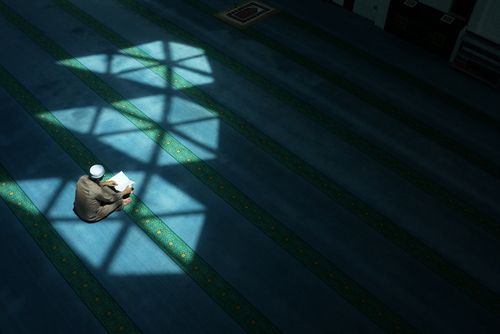Reclaiming the narrative of hijrah
Reclaiming the narrative of hijrah
This article was first published in Aug 2019. It has since been updated as of July 2024

Praise be to Allah.
Hijrah holds profound significance in the Islamic tradition, encompassing historical, spiritual, and ethical dimensions. The vast majority of Muslims view that hijrah represents a continual process of becoming better and moving away from sin towards God-consciousness.
Read: 5 key messages of hijrah
Unfortunately, violent extremist groups have been misusing their misinterpretation of hijrah to rally people to move to their territories and join their cause. They have also been using ‘hijrah’ to sow doubt among Muslims, especially those living in non-Muslim majority states.[1]
So what exactly is the meaning of ‘hijrah’, and how have violent extremist groups exploited the term to mobilise their objectives?
The meaning of hijrah
In Arabic, ‘hijrah’ simply means ‘emigration’. Historically, it refers to Prophet Muhammad’s migration from Makkah to Madinah during his 13th year as a prophet, which coincides with 622 CE. In the early days of Islam, Prophet Muhammad s.a.w. and his followers were ill-treated and harassed by Makkan Arabs over differences in religious beliefs.

They were subjected to economic and social boycotts and barred from marriage and trade. When these tactics failed to stop people from converting to Islam, the aristocratic Quraysh clan resorted to physical abuse.
This triggered the first hijrah to Abyssinia (modern-day Ethiopia), then ruled by a Christian king named Ashama Ibn Abjar r.a, better known as The Negus (Najashi). The Quraysh intensified their violence when they learned that several Muslims secretly sought refuge in Madinah. This meant a severe escalation of efforts to stop the practice of Islam, from mistreatment to violence, including an assassination plot against the Prophet s.a.w.
Read: Religious freedom: Islam and religious minorities
These developments led to Prophet Muhammad’s migration to Madinah, which marked the second and final hijrah in Islam’s history. Historically, hijrah was, in effect, a means to preserve the fundamental right to practise one’s faith and protect one’s life.
Distortion of hijrah by violent extremist groups
Violent Extremist Groups, who exploit Islamic terms to justify their cause, often frame hijrah as a religious obligation, an act of worship that would bring a Muslim close to God, and a manifestation of true faith.
They claim that Islam requires Muslims to live in an ‘Islamic state’ that practises Shariah law over a territory governed by non-Muslims or by Muslims administering human-made laws. It asserts that Muslims should leave their country (especially in the Middle East), and relocate to the ‘ideal’ caliphate, like those IS-controlled territories.
Read: Addressing misconceptions: Governance in Islam
Both the Quran and Hadith were distorted to justify these misinterpreted arguments.
Read: Understanding the sunnah of the Prophet s.a.w.
The correct understanding of hijrah
Hijrah, to a specific territory, is not among the best forms of worship and does not necessarily bring a Muslim closer to God. Many acts of worship, from regular prayers and repentance to generous donations and charitable acts, bring a Muslim closer to God.
Read: How to pray in Islam

In a hadith, Sahl Ibn Hunayf r.a. reported that Rasulullah s.a.w. said:
مَنْ تَطَهَّرَ فِي بَيْتِهِ ثُمَّ أَتَى مَسْجِدَ قُبَاءَ فَصَلَّى فِيهِ صَلَاةً كَانَ لَهُ كَأَجْرِ عُمْرَةٍ
“Whoever purifies himself in his house, then comes to the Quba’ Mosque and offers one prayer therein, will have a reward like that for Umrah.”
(Sunan Ibn Majah)
The above hadith implied that whoever comes to the mosque of Quba’ (in Madinah) and prays in it will have a reward similar to performing an umrah (minor pilgrimage). This suggests that location is not fundamental to getting closer to God but rather the performance and quality of our acts of worship.
Violent extremist groups have also falsely claimed that Prophet Muhammad s.a.w. instructed Muslims to sever ties with family and tribe by performing hijrah. The quoted hadith was actually a directive for newly converted Muslims to detach themselves from the religious practices of their people, not blood ties. This is to distinguish themselves from other faith groups by observance of religious obligations.
Maintaining good relationships with non-Muslim family members is part of Islamic teachings. This is evident in the Prophet’s behaviour towards his two non-Muslim paternal uncles. Hence, there is nothing Islamic about a Muslim leaving his family and heading to join violent extremist groups with the hope of receiving blessings from God and dying as a martyr.
Read: Addressing misconceptions: Jihad and Martyrdom
Way forward: Migration from literalism
Lastly, Prophet Muhammad s.a.w. was reported as saying:
لَا تَنْقَطِعُ الْهِجْرَةُ حَتَّى تَنْقَطِعَ التَّوْبَةُ وَلَا تَنْقَطِعُ التَّوْبَةُ حَتَّى تَطْلُعَ الشَّمْسُ مِنْ مَغْرِبِهَا
“Hijrah will not cease until repentance is ceased. Repentance will not cease until the sun rises from the west (a major sign of the end of time)”
(Sunan Abi Daud)
Although the above hadith is authentic, one must read it while complemented with an understanding of its implicit objective.
In the above hadith, hijrah does not suggest a physical relocation but rather a change in mindset and behaviour. Islam promotes progressive thinking and positive change in life. A believer must think of ways to become a better person each day to benefit himself and those around him, including animals and nature.

A Muslim who learns Islam by heart and perseveres to ponder its teaching marks a ‘hijrah’ in the cognitive attitude towards his or her faith, from one that is literalist to one that is pragmatist.
Hijrah is also a manifestation of a paradigm shift. A Muslim who constantly seeks to upgrade his knowledge so that he can be of service to others is expressing a form of hijrah towards becoming a useful and productive Muslim. Similarly, a Muslim who strives to distance himself from evil is making hijrah towards becoming a better Muslim who understands his religion holistically.
And Allah knows best.
Read: Trusting Allah in difficult times
[1] Ayad, M. (2024, March 19). “Don’t you want to go on vacation?”: Hawking ‘hijrah’ to the African affiliates of the Islamic State. Institute for Islamic Dialogue.

